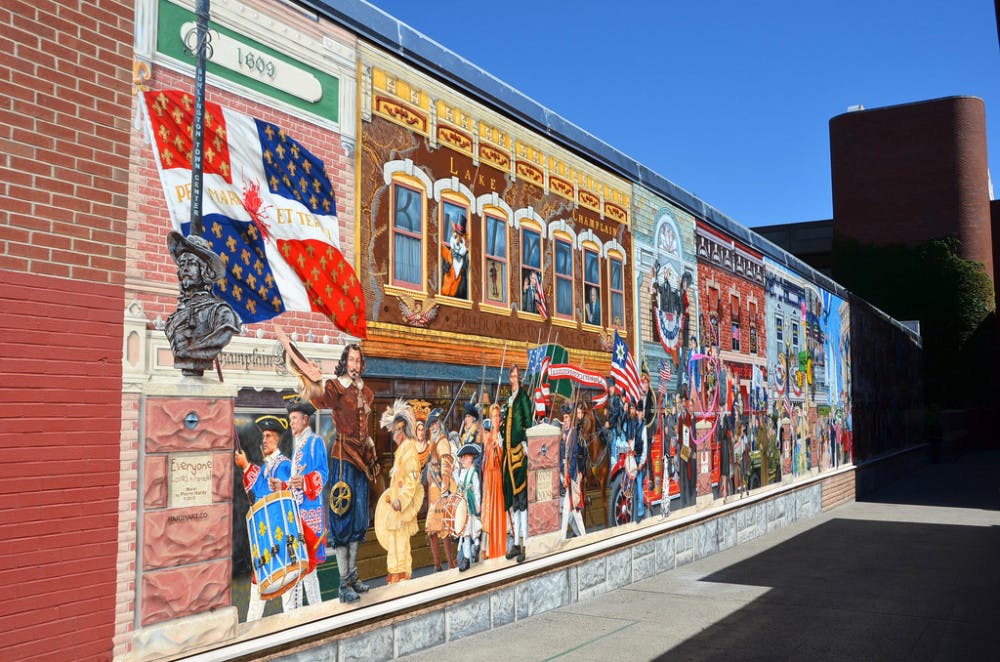The controversial mural titled “Everyone Loves a Parade” on Church Street Marketplace in Burlington was vandalized for the second time in two weeks on Thursday, Nov. 1. The 124-foot long mural located on the main pedestrian thoroughfare, which focuses on portraying Burlington throughout its history, has been criticized for excluding the histories of the Abenaki and people of color.
The vandalism involved defacing the faces on the left side of the mural with chemical solvent and then spray-painting pink dollar signs onto the mural in what is believed to be an act of political protest. The damaged portion of the mural is currently covered in blue tarp. Jon Murad, chief deputy of operations for the Burlington police department, told The Campus that while the department has “unidentified persons of interest,” they have “not identified any suspects at this time.”
Burlington Mayor Miro Weinberger immediately condemned the act of vandalism, stating in a press release that the “vandal(s) has disrespected those engaged community members and the democratic rule of law.” Murad echoed the mayor’s statement, saying that “the suspect or suspects also unilaterally set themselves above the community, and arrogated to themselves the decisions that belonged to the community.”
A task force designated to determine a course of action in regards to the mural voted on Oct. 15 to have the mural removed by August 2022. This date allows the city to comply with its agreement with the artist and the businesses that funded its creation. A plaque is to be added explaining that the mural does not represent the entirety of Burlington history. The recent vandalism incident has not impacted the decided date of removal of the mural.
An incident had occurred previously on Oct. 19 in which the word “colonizers” was sprayed above the mural. The spray paint used in this incident was easier to remove than the most recent vandalism as it was located above the main images depicted in the mural. Police have reason to believe that the two incidents are related.
In October of 2017, activist Albert Petrarca spray-painted “Off the Wall” on the plaque accompanying the mural. Petrarca and his Off-the-Wall coalition have been the most vocal advocates of removing the mural, claiming that the recent decision of the task force promotes white supremacy. Albert Petrarca was charged with unlawful mischief in January. He did not respond to a request for comment.
[pullquote speaker="OLIVIA JIN" photo="" align="center" background="on" border="all" shadow="on"]There are ways to protest yet maintain respect of legal authority.[/pullquote]
The mural was designed by Montreal-based artist Pierre Hardy and uses a technique called trompe-l’oeil, in which figures appear three-dimensional and to scale with their surroundings. The mural commemorates the 400th anniversary of the “discovery” of Lake Champlain by Samuel de Champlain. It features a portrayal of Lake Champlain history through important figures and businesses in Burlington, from Bernie Sanders to Sweetwater’s American Bistro to Ethan Allen.
The mural, according to critics, does not accurately include the role of Native Americans, especially the Abenaki tribe, in the history of Lake Champlain and Burlington. In response to a reply-all email from Patrarca to councilors and media, Chief of the Abenaki tribe Don Stevens condemned the protests as “counterproductive.” In May, the Abenaki Alliance and the mayor announced a partnership to promote Abenaki history in lieu of participating in the task force concerning the mural. Such a partnership may potentially result in displays of Abenaki artifacts in Burlington airport and at a summer festival on Church Street.
Olivia Jin ’20, president of Middlebury College’s Amnesty International club, expressed concern for the exclusion of Native Americans from historical narratives.
“The removal of Native Americans from U.S. history is a nationwide problem, and the exclusion of the Abenaki tribe in the portrayal of the Lake Champlain history is problematic,” Jin said. “Native Americans have been, and still are, vulnerable to human rights violence in the U.S., and as a human rights group, we stand by Native Americans and support the movement to change the narrative.”
The controversy surrounding the “Everyone Loves a Parade” mural invokes questions regarding the proper form of action in protest of selective histories and racism, reflecting national discussions concerning the removal of monuments and artwork that people believe promote racism. Burlington serves as an example of a city struggling to reconcile an accurate portrayal of history with artworks already in place.
Responding to questions about appropriate forms of protest, Jin said, “I personally think there are ways to protest yet maintain respect of legal authority.” She acknowledged that “the impacts of these actions are slow to see,” which can lead some to “question the extent to which these methods are effective and choose other forms of protests.”
The authorities in Burlington have made clear that this crime will be taken seriously regardless of its motive. The mural and the actions surrounding it have generated public discussion of diversity, inclusion and protest in the city of Burlington. Weinberger claimed in his press release that “when arrests are made we will seek full prosecution of the perpetrators.” Regardless of the outcome of the case or the motivations of the crime, Murad told The Campus that the police department is “taking the crime very seriously.”

Lucy Townend '22 is a Managing Editor alongside Abigail Chang.
She previously served as a senior section editor, a local editor, and a copy editor.
Townend is majoring in International Politics and Economics, studying French throughout her years at Middlebury and is planning on completing a thesis focused on income inequality and regime change.
This previous summer, Townend interned as a private banking analyst at a mid-sized bank in Chicago and plans to continue her work there after graduation.




